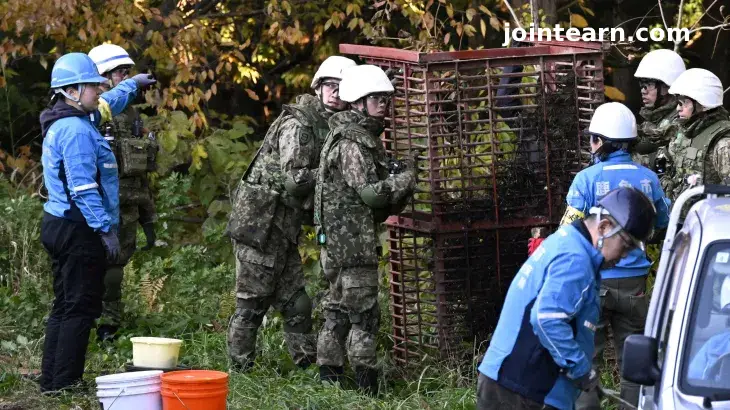
Japan is facing an unprecedented surge in bear attacks, prompting the deployment of military forces in the northern prefecture of Akita. Since April, the country has recorded at least 12 fatalities and over 100 injuries due to encounters with brown bears and Asiatic black bears, highlighting a growing public safety crisis.
Rising Bear Attacks Threaten Residents in Northern Japan
The Japan Self-Defense Forces (JSDF) have been mobilized to assist local authorities in managing the escalating threat. Soldiers are setting up bear traps, assisting hunters, and helping dispose of deceased bears, though they are not permitted to open fire on the animals. This measure comes as experts warn that the region’s rapidly ageing population and declining rural communities are exacerbating the problem.
“Every day, bears intrude into residential areas in the region and their impact is expanding,” said Deputy Chief Cabinet Secretary Fumitoshi Sato. “Responses to the bear problem are an urgent matter.”
The military operation commenced in Kazuno City, a forested area with frequent bear sightings and attacks. JSDF members, equipped with bulletproof vests, bear spray, and net launchers, have begun placing traps near orchards and other vulnerable sites.
Bears Enter Residential Areas Amid Food Scarcity
The surge in bear activity is partly linked to the approach of hibernation season, as bears forage for food. Reports have emerged of bears roaming near schools, train stations, supermarkets, and even hot spring resorts, causing widespread alarm among residents.
Local orchard owners are already facing significant losses. Takahiro Ikeda, an orchard operator, reported that more than 200 apples were eaten by bears before they could be harvested. “My heart is broken,” he told NHK television.
The Japanese government estimates that there are over 54,000 bears nationwide, underscoring the challenge of controlling the population in rural areas where hunting expertise is limited.
Government Response and Limitations
Defense Minister Shinjiro Koizumi emphasized that while the military’s involvement aims to protect public safety, their primary responsibility remains national defense. The troops will provide support to local hunters but cannot offer unlimited intervention.
Akita Prefecture, home to approximately 880,000 people, has recorded over 50 bear attacks since May, resulting in at least four deaths. Victims include elderly residents, farmers, and a newspaper deliveryman, demonstrating the wide-reaching impact of the crisis.
Experts note that Japan’s ageing rural population and low density of trained hunters contribute to the increasing frequency of bear encounters. They argue that culling may be necessary to maintain a balance between human safety and wildlife populations, as the bears are not considered endangered.
The Human-Wildlife Conflict Intensifies
The recent bear attacks have heightened awareness of human-wildlife conflict in Japan, sparking discussions on the need for proactive measures to prevent future tragedies. Authorities continue to monitor the situation closely as the bears’ natural behavior drives them closer to human settlements in search of food.
The JSDF operation in Akita is a temporary but crucial response to an urgent problem, aiming to safeguard communities while long-term wildlife management strategies are developed.


Leave a Reply